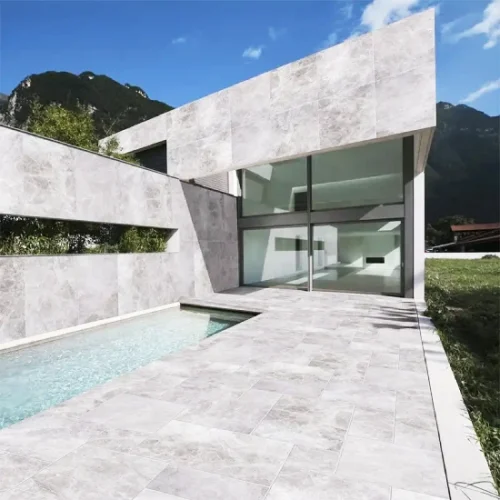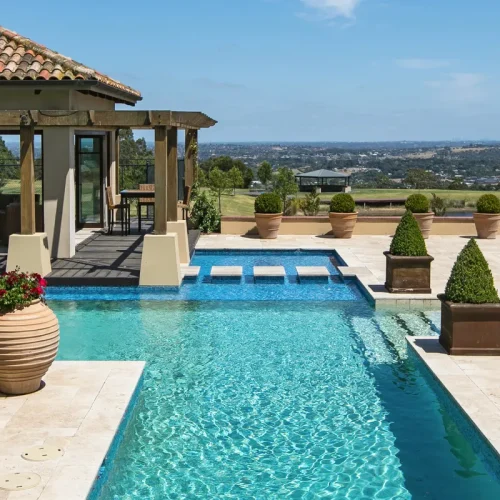

Stone Pool Coping Tiles: The Ultimate Guide
Enhance your pool’s beauty and functionality with high-quality stone pool coping tiles. Discover how to choose, install, and maintain these essential
elements for a stunning pool area.
Introduction: Elevate Your Pool with Stone Pool Coping Tiles
When it comes to creating a picturesque and functional pool area, the choice of pool coping tiles plays a pivotal role. Stone pool coping tiles not only add a touch of elegance and sophistication but also serve practical purposes, such as preventing water damage and ensuring a safe transition between the pool and the surrounding deck. In this comprehensive guide, we’ll delve into the world of stone pool coping tiles, exploring their benefits, installation process, maintenance tips, and much more.
Stone Pool Coping Tiles: The Foundation of a Beautiful Pool
Stone pool coping tiles are the edge or cap that runs around the top perimeter of a swimming pool. They serve as a protective barrier, preventing water from seeping into the pool’s structure and also providing a comfortable edge for swimmers to rest or hold on to. These tiles come in a variety of materials, with natural stone being a popular choice due to its durability, versatility, and timeless appeal.
Benefits of Stone Pool Coping Tiles
Stone pool coping tiles offer a multitude of benefits that make them a superior choice for both aesthetics and functionality. Some key advantages include:
Durability: Natural stone coping tiles, such as granite, travertine, or limestone, are renowned for their durability. They can withstand the harsh outdoor elements and the chemicals used in pool water, ensuring a long-lasting solution.
Elegance: The natural beauty of stone adds a touch of elegance to any pool design. Whether you prefer a classic or contemporary look, there’s a stone type that perfectly complements your vision.
Safety: Stone coping tiles provide a non-slip surface, enhancing safety around the pool area. This is especially important to prevent accidents, particularly when the tiles are wet.
Low Maintenance: Stone coping requires minimal maintenance. Regular cleaning and occasional sealing are usually sufficient to keep them in pristine condition.
Choosing the Right Stone for Your Coping Tiles
Selecting the right stone for your pool coping tiles is crucial to achieving the desired look and ensuring durability. Here are some popular stone options to consider:
Travertine Stone Coping Tiles: Timeless Beauty
Travertine, with its subtle color variations and unique texture, is a popular choice for pool coping. It remains cool to the touch, making it comfortable for bare feet on hot days. Its natural beauty and resistance to heat and moisture make it a reliable option.
Granite Stone Coping Tiles: Unparalleled Strength
Granite is a robust and highly durable stone, perfect for areas with heavy foot traffic. Its strength, coupled with a wide range of color options, makes it a versatile choice for pool coping. Granite coping tiles can withstand the test of time and maintain their elegance.
Limestone Stone Coping Tiles: Understated Elegance
Limestone exudes a timeless and sophisticated charm, making it an excellent choice for creating a luxurious pool area. It’s available in various shades and can be honed or polished to achieve the desired finish. Limestone coping tiles age beautifully, adding character to your pool over the years.
Installation Process: Ensuring a Flawless Finish
Proper installation is crucial to ensure the longevity and beauty of your stone pool coping tiles. It’s recommended to hire a professional for this task, as they have the expertise to handle the intricacies of the installation process. Here’s an overview of the installation steps:
Surface Preparation: The pool deck must be clean, level, and free of any debris before the installation begins.
Applying Mortar: A layer of mortar is spread over the pool’s top edge, providing a secure base for the coping tiles.
Setting the Tiles: The coping tiles are carefully placed on the mortar, ensuring a level and uniform alignment. Spacers may be used to maintain consistent gaps between the tiles.
Grouting: Once the tiles are in place, grout is applied to fill the gaps between them, enhancing the overall stability and appearance.
Sealing: To protect the stone and prevent water damage, a high-quality sealer is applied to the coping tiles.
Maintenance Tips for Stone Pool Coping Tiles
Maintaining your stone pool coping tiles is essential to keep them looking pristine and functioning effectively. Here are some tips to ensure their longevity:
Regular Cleaning: Sweep away debris and rinse the coping tiles with water regularly to prevent dirt buildup.
Avoid Harsh Chemicals: Use mild, pH-neutral cleaners to clean the tiles. Harsh chemicals can damage the stone’s surface.
Sealing: Depending on the type of stone, resealing may be necessary every few years. Consult with a professional to determine the appropriate sealing schedule.
Address Repairs Promptly: If you notice any loose or damaged tiles, address the issue promptly to prevent further damage.
FAQs about Stone Pool Coping Tiles
How do I choose the right stone for my pool coping tiles?
Choosing the right stone involves considering factors such as durability, aesthetic preferences, and budget. Consult with a professional to determine the best option for your specific needs.
Can I install stone pool coping tiles myself?
While it’s possible to attempt a DIY installation, it’s highly recommended to hire a professional for this task. Proper installation requires expertise to ensure a flawless finish.
How often should I clean my stone pool coping tiles?
Regular cleaning, at least once a week, is recommended to prevent dirt buildup. However, the frequency may vary based on the pool’s usage and surrounding environment.
Do I need to seal my stone pool coping tiles?
Yes, sealing is essential to protect the stone and maintain its appearance. Consult with a stone care professional to determine the appropriate sealing schedule.
Can I use stone coping tiles for both saltwater and chlorine pools?
Yes, most natural stone coping tiles are suitable for both saltwater and chlorine pools. However, it’s essential to choose a stone that is resistant to the chemicals used in the pool.
How do I repair a chipped or damaged stone coping tile?
If a coping tile is chipped or damaged, it’s best to consult with a professional for repair or replacement. Attempting to fix it yourself may result in further damage.
Transform Your Pool with Stone Pool Coping Tiles
Stone pool coping tiles are more than just a functional element; they are a design statement that elevates the aesthetics and safety of your pool area. With their durability, elegance, and low maintenance requirements, stone coping tiles are a wise investment for any pool owner. By choosing the right stone, ensuring proper installation, and following maintenance best practices, you can enjoy a beautiful and inviting pool for years to come. View our range of NATURAL STONE POOL COPING.



